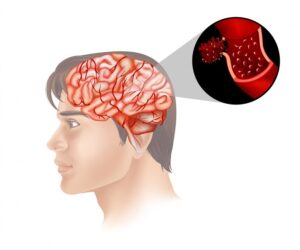A Stroke is a medical emergency that occurs when the blood flow to a part of the brain is interrupted. This can cause serious damage to the brain and may even be fatal if not treated quickly. Recognizing the early signs of a stroke can make a huge difference in saving someone’s life or reducing long-term damage. Dr. Girish Nair, a well-known expert in neurology, emphasizes the importance of knowing the warning signs so that immediate action can be taken.
What Is a Stroke?
A Stroke happens when a blood clot blocks a blood vessel in the brain (ischemic stroke) or when a blood vessel in the brain bursts (hemorrhagic stroke). Both types can result in brain damage. The faster medical help arrives, the better the chances of recovery.

Early Warning Signs of a Stroke
Knowing the symptoms of a stroke can save someone’s life. Dr. Girish Nair encourages everyone to learn these signs and seek medical help immediately if any of them appear.
-
Sudden Numbness or Weakness One of the most common signs of a stroke is sudden numbness or weakness, usually on one side of the body. It might affect the face, arm, or leg. If you notice one side of the face drooping, it could be an indication of a stroke. Dr. Nair recommends asking the person to smile and see if the smile is uneven.
-
Confusion or Trouble Speaking If a person suddenly becomes confused or has difficulty understanding speech, it could be a sign of a stroke. They may also have trouble finding the right words or speaking clearly. If you notice someone struggling to communicate, it’s essential to act fast.
-
Vision Problems Blurred or double vision can occur during a stroke. The person may suddenly have trouble seeing in one or both eyes. This symptom may not always be obvious, so it’s important to be alert if the person complains of vision issues, especially if it’s sudden.
-
Sudden Severe Headache A sudden, severe headache with no known cause could be a warning sign of a stroke, particularly if it’s accompanied by nausea or vomiting. This symptom is more common in hemorrhagic strokes, where a blood vessel bursts in the brain.
-
Trouble Walking or Loss of Balance Strokes can cause sudden dizziness, loss of balance, or difficulty walking. A person might feel unsteady or have trouble coordinating their movements. If someone suddenly has trouble walking, it’s important to seek medical help immediately.
What to Do if You Spot a Stroke
If you notice any of these signs, it’s important to act quickly. Dr. Girish Nair emphasizes the need to use the FAST method to remember what to do:
- F: Face – Ask the person to smile. Is one side of the face drooping?
- A: Arms – Ask the person to raise both arms. Does one arm drift downward?
- S: Speech – Ask the person to repeat a simple sentence. Are they able to speak clearly?
- T: Time – If you notice any of these signs, get help immediately. Call emergency services without delay.
Why Timing Is Critical
The brain is very sensitive to changes in blood supply. When a stroke occurs, the affected part of the brain starts to lose oxygen and nutrients, which can lead to irreversible damage. The sooner treatment begins, the better the chances of recovery. Dr. Girish Nair explains that for ischemic strokes, a clot-busting drug can be administered within the first few hours, significantly reducing damage.
Conclusion
Stroke is a serious condition, but recognizing the early warning signs can help save a life. Dr. Girish Nair urges everyone to be aware of these signs and act quickly. By using the FAST method and getting medical help immediately, you can make a big difference in how someone recovers from a stroke. Don’t wait—acting quickly can mean the difference between a full recovery and lasting brain damage.
